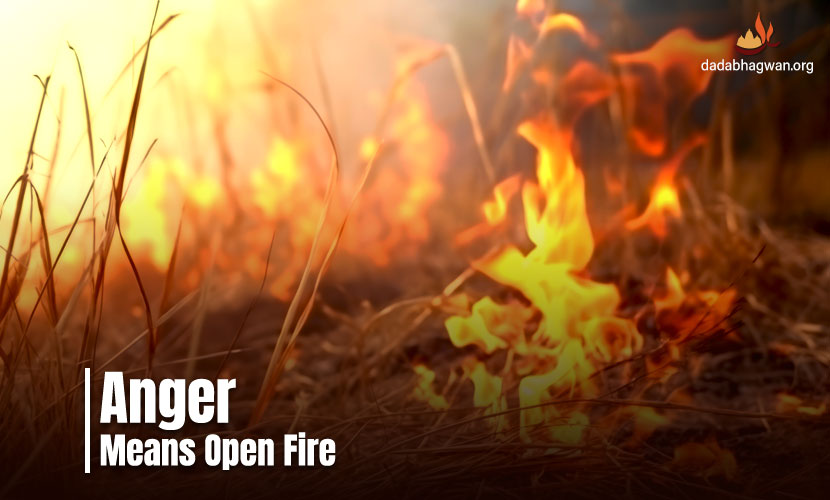What is anger?
Anger Means Open Fire
Anger means you yourself lighting a match to your own house, in which first you yourself burn, and then burn others. What would happen when in a field, large piles of dry grass are collected and then only one lit match is thrown into that grass? With a raging fire, all grass begins to burn and things around it also burn. Similarly, in your house, grass is filled and lighting a match to it is called anger. First you burn and then you burn your neighbour. This is the most overt answer to what is anger!

Anger Is a Weakness
Some people get angry and slam the table if the tea, served to them in the morning, is cold. Some people, if their craving for food is not satiated, if food is not prepared well, then they get angry and vandalize things. Some create clashes in the house upon not getting what they want. Some people get angry when they have incurred great loss. Mostly, people get angry when things do not happen as per their wish. So, external factors do not cause anger, but our internal passions (kashays) cause anger. Thus, anger is our weakness. People who get angry every now and then, their influence on people gets to zero. This is the most subtle aspect of what is anger!
Due to the weakness of anger, a person’s body may look fine, but inside mentally, one experiences weakness, the stability is broken, endurance keeps reducing.
The Form of Anger
Anger is fierce molecules. Just like the ammunition is filled in a firecracker, when that explodes, it burns. Then when all the ammunition, that’s inside, finishes; the firecracker calms down on its own. The same is true of anger.
There are two types of anger. One type of anger can be turned – changeable. Meaning if we are angry on someone, then internally, it can be changed and calmed down – that is the anger that can be turned. When one reaches this stage, his behavior becomes very beautiful!
Second type of anger is one that cannot be turned – inevitable. No matter how hard one tries, but once lit, the firecracker is bound to burst! Similar is the anger that cannot be turned. Such anger harms oneself for sure, but it terribly harms the other person as well!
Param Pujya Dada Bhagwan says that, “I do not refer to the prevalence of heatedness (ugrata) as anger; the prevalence of a lingering effect in anger is what is referred to as anger. It is referred to as anger when there is an inner burning within. To have inner burning means one feels the flames within and other people also feel its effect. That is in the form of visible anger (kadhapo). Whereas in the form of invisible anger (ajampo), one keeps burning within on his own. However, the lingering effect remains in both forms. Whereas heatedness is a different thing.”
Grudge Remains—That’s Called Anger!

If there’s grudge, that only is called anger. For example, husband and wife quarreled at night, tremendous anger flared up, the two lay awake all night. Then in the morning, when the wife brings tea, she bangs the cup of tea when placing it on the table. So, the husband understands that the wife still has a grudge against him! Meaning, the quarrel that happened yesterday, it continues to linger. That is another meaning of anger. From the face turned bad, one understands that there is grudge. Then the grudge could be for any amount of time. Some people hold grudge for the whole life! If there happens a quarrel between the father and son, the father does not see his son’s face for years, and the son does not see his father’s face!
Fifteen years ago, someone insulted us, and for fifteen years, we did not meet that person. But today, if we come across that person, then as soon as we meet, we remember everything of what happened in the past, fifteen years ago, that is called holding grudge. No one can get rid of grudge easily. If you have upset someone just once, and then he does not speak to us for fifteen days, that is grudge! This is another subtle aspect of what is anger!
Anger Means the Guard of Pride
In humans, primarily four kashays namely anger-pride-deceit-greed are working within. In there, anger and deceit are as a guard of pride and greed respectively. Anger is the guard of pride, that is, when the pride seems to have been threatened, one becomes angry and protects it.
For example, one person says to the other person in insulting words that, “You are nonsense!” Then, the other person gets angry and snaps back stating, “Who are you to call me nonsense? Where do you have any sense?” Thus, when insulted, getting angry immediately means one’s pride is being protected through anger.
Mostly when we get less respect than expected, when we don’t get respect, when we get insulted, when someone doesn’t do as we say, we feel insulted then, and we get angry. In all these instances, protection of the passion of pride happens through anger.
Difference between Anger with Violent Intent and Anger without Violent Intent!
Normally, anger with violent intent (Krodh) and anger without violent intent (Gusso) are synonymous words. But Param Pujya Dada Bhagwan points out a subtle distinction between the two.
Questioner: Dada, what is the difference between gusso (becoming upset) and krodh?
Dadashri: Krodh is that which is with ego. When gusso and ego are combined, then it is referred to as krodh. And when a father gets angry with his son, that is not considered krodh. The ego does not become involved in that anger. That is why it is referred to as gusso.
Mostly in this world, ego is mixed in the anger that happens while in the state of ignorance. In it is a violent intent, there is grudge, one himself burns and burns others. Anger that happens after Self-Realization is weak (without any strength). It does not contain any violent intent. That anger is in the form of a result and it leaves upon giving the effect.
subscribe your email for our latest news and events





